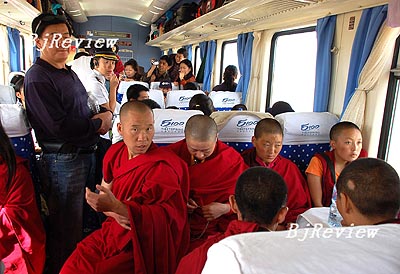
Traveling to Tibet by train is a cosmopolitan experience. The train carries people from all corners of the world -- from China, Europe, the Americas and elsewhere -- drawn by Tibet's culture.
On this particular journey among the passengers sat the peaceful 33-year-old Monlam Darjii, a master of Tibetan Buddhism, who left Tibet three years ago to preach his religion in Yunnan and Qinghai.
"It's much more convenient for us constantly traveling monks to get to exchange programs with other temples around the country," said the master, who has been on the Qinghai-Tibet Railway line twice.
This time he was leading some 15 Buddhist monks and nuns, dressed in crimson robes, to pay a visit to a temple in Naqu, a town in north Tibet.
In the same compartment sat Karen Parshall, a professor from the University of Virginia, who was on her way to a conference on the history of science in Tibet.
"The crew of the train are very friendly," she said, adding that the service and facilities were pretty good too, except for the toilet.
Tourism boost
Parshall boarded the train a few days after the one-year anniversary of the line's opening on July 1, 2007. One year ago the Qinghai-Tibet Railway was officially launched and since then it has carried 2.6 million passengers and 13 million tons of cargo, without serious accidents, according to Qiangba Puncog, Chairman of the Tibet Autonomous Region Government.
"When the rails rattle, the money comes in" said Losang Cering, 40, of Liuwu Village, near the Lhasa railway terminal, describing the benefits the rail line has brought.
"Before, we depended on the land for a living, but now my people are working in construction, running home-style hotels, and some are driving cabs. They can earn about 2,000 yuan ($265) a month now, an unimaginable sum before," he said.
Zha'nor, Deputy Director of Tibet Tourism Bureau, said the Qinghai-Tibet Railway solved transportation difficulties that had hindered tourism development in the region. Prior to its launch on July 1, 2006, tourists could only reach Tibet by air or road.
The region hosted more than 2.5 million tourists last year, including 154,800 from overseas. This year, it expects to host three million tourists and bring in 3.4 billion yuan in tourism revenue.
Tibet aims to receive six million tourists from across the globe in 2010 with at least six billion yuan in tourism income, or 12 percent of the region's gross domestic product, the regional government said.
The income generated by the trains might be huge, but some foreign travelers are not entirely satisfied with them. "The toilet is not clean," complained 21-year-old Claudia from Austria, who traveled from Beijing to Lhasa by the train, which is installed with an advanced vacuum-toilet-cleaning system.
"The toilets should be clean. But many of the passengers from the rural areas are not used to them and don't know how to operate the flush button," said Chief Conductor Liu Aihong.
"If people travel more often on the train they will become accustomed to using the toilets, so the situation is sure to get better in the future," he added.
While the train has brought with it great potential for tourism in Tibet, it is limited to some extent by the fact only five trains run daily bringing with them 3,000 passengers. As a result, there is a scarcity of train tickets that has led to some travel agencies having to cancel trips.
According to Qinghai Vice Governor Jidi Majia, travel agencies in the province in 2006 canceled more than one thousand trips to Tibet, involving 30,000 travelers and a penalty sum of 200,000 yuan.
| 